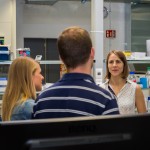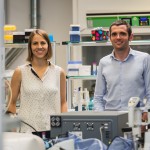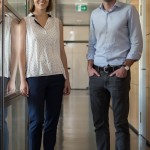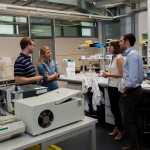Branch
Select your branch
An interview with Kristen M. Lorentz & Stephan Kontos
Anokion is a company based at EPFL lead by a diverse team of entrepreneurial scientists and industry-weathered professionals, striving to achieve the goal of offering antigen-specific immunotherapy to patients worldwide.
The science behind your startup “Anokion” came out of your thesis research. What were the most important ingredients present in your lab environment that allowed you to transform your research into a startup?
Stephan: Launching Anokion from Jeff Hubbell’s lab at the EPFL definitely benefited from the diversity of resources and talent within the group. The technology we developed required mastery of a gamut of techniques, from molecular biology and biochemistry to conducting fairly intricate immunological modeling in the mouse, all of which were present in the lab, including to this day. Jeff works hard to ensure his lab is particularly well-funded, which meant that we almost always had the right tools and reagents to conduct key, value-driven experiments. It helped that the collegial environment of the group meant a potential solution to a technical hurdle could be readily available in the form of a labmate’s advice, and the quality of the core facilities in Life Sciences added to the scope of work that was possible to conduct efficiently. Of course, an essential ingredient was Jeff’s interest and experience in translating life science technologies to clinical development through start ups, and without his support and guidance, it would have been far more difficult to have built Anokion into what it is today.
What were the main factors that made you decide to go for a career as scientist-entrepreneurs rather than for an academic career?
Stephan and Kristen: In academia, one is taught to test a hypothesis with the scientific process of experimentation – the culmination of which may be aimed at sharing gained knowledge in public forms, such as peer-reviewed journals and conferences.
In the biotechnology industry, the litmus test of success may be creation of a product and validation in human clinical trials. Although the latter path is typically longer, riskier, and fraught with failures, we draw great satisfaction in working to translate scientific work into tangible products that may improve people’s lives. So, with Jeff as a guide, we jumped into the world of biotechnology entrepreneurship and have not looked back!
What are the top three pro’s and con’s of having chosen to become scientist-entrepreneurs?
Stephan and Kristen:
Pros:
- Bringing a novel technological or therapeutic solution to the world is a very gratifying reason to come to work every day.
- Becoming deeply involved in many aspects of a company’s process that would have taken far longer to experience in larger companies.
- Building an entire company from the ground-up is an exhilarating process, as is getting to develop company strategies and to choose who you work with.
Cons:
- There are numerous personal sacrifices along the entrepreneurial path, some of which are difficult to harmonize with family and social life.
- The risks one is required to take are diverse in type, and rather substantial, so one must be prepared for the eventual possibility of failure.
- At times you need to jump into a role that you have no previous experience in, and this can be stressful, especially if you are the type to strive to surpass expectations.
What are the most challenging situations that you encounter as young entrepreneurs in a field that is dominated by more senior people with years of experience?
Stephan: In the vast majority of interactions with potential investors and partners, I have never felt that age discrepancies were an issue, but perhaps this is due to the fact that our founding team included those with extensive experience in entrepreneurship. Had we been a team all in our 20’s, my experience might have been different, and I might have sensed this. In general, I have found that investors and potential partners are a sharp bunch – if you have a brilliant idea and pitch it well, they will recognize this and help you harness the potential, regardless of what year you were born.
Millennials –the generation who is currently coming onto the professional stage – are known to be highly ambitious, highly connected, somewhat narcissistic, and unbelieving in authority. Do you feel like this description fits you?
Stephan: An interesting question – am I considered a Millenial? The increase in personal media platforms and general sense of immediate gratification that have grown to be the social norms stemming from the growth of the internet simply did not exist when I was younger, so perhaps my point of view, as someone born in 1984, greatly differs from someone born 15 years later. However, I would think that ambition is indeed a significant trait of my character, whereas I usually find myself turned off by those with substantial amounts of the latter two characteristics. For better or worse, entrepreneurship and academia are worlds populated with egos, but I have been lucky enough to be mentored by brilliant yet humble scientists. A characteristic you have not listed above, but that I believe is essential to success in entrepreneurship, is a hard work ethic. In my opinion, it does not matter how well-connected, brilliant, or ambitious you might be if you do not also do the following: work hard – and quite frankly, work very hard. This is perhaps an old cliché, but I feel its value in success should not be overshadowed by other factors such as academic pedigree or personal connections in an industry. I like to think good things come to those with a hard work ethic.
Being part of the Millennials, what do you think differentiates you from previous generations of entrepreneurs?
Stephan and Kristen: This generation of entrepreneurs has the key advantage of existing in a highly-connected world at a time where gender and race discrimination continue to decline. It is wonderful to be part of a generation where high quality education can be streamed online to areas of the world bereft of advanced schooling, and to individuals across the income spectrum. Access to cutting-edge technologies and the latest scientific reporting is much more rapid (if not instantaneous) than before, meaning that the hurdle to getting your message out, or identifying accompanying technology or techniques to improve on your own, is far lower than ever before. On the other hand, competition is tough, so differentiating oneself from the noise and gaining access to capital may take more effort than in decades past. This creates somewhat of a loop whereby we have to become even better at what we do in order to succeed, which I believe is a good thing for the entrepreneurial world.
What do you think are the most important factors that could drive more scientist from the Millennial Generation into becoming biotech entrepreneurs?
Stephan and Kristen: A key to fostering entrepreneurial success is a fertile environment, and it all starts with academic rigor coupled with creativity. Ensuring those aspects are present in the pillars of an education system definitely plants a seed from which a biotech entrepreneur might arise. In my opinion, the love of entrepreneurship alone is not sufficient to create a success – the recipe is far more complex, with the main ingredient being the innovative technology and its path to a valuable application (and in biotech, a clinical application). Thus, teaching entrepreneurship in universities may assist in fostering a fertile environment, but is no replacement for the quality of the scientific curriculum In biotechnology, access to lab space is an absolute necessity, yet is has become increasingly difficult to find in the area, and I would hope that this is recognized by local economic developers as a potential for growth.
What is your longterm vision for Anokion?
Stephan and Kristen: Anokion is still in its infancy, yet I feel we have already accomplished quite a bit. We recently embarked on a partnership with Astellas Pharma to leverage our antigen-specific immune tolerance technology to develop targeted therapies for type-1 diabetes and celiac disease, through our sister company Kanyos Bio. This first alliance is an exciting prospect for Anokion to showcase our technology in indications that we would otherwise not have had the resources to pursue at this time. At Anokion, we remain focused on developing new-generation therapeutic proteins that do not induce dangerous immune responses generated by the patient – the so called “anti-drug antibody responses” that are induced when a patient’s immune system perceives the beneficial therapeutic protein as foreign and mounts an immune attack against the drug. We have a few therapeutics in our internal pipeline, with the goal of taking them through clinical development and into human Phase I trials in the near future. Given the broad applicability of the technology, we will continue to pursue partnerships in autoimmunity and in protein drug tolerization, where we find exceptional cases for potential. Our vision is to grow Anokion into a specialty biotechnology company, creating novel tolerizing therapeutics for patients worldwide.





